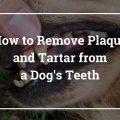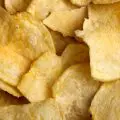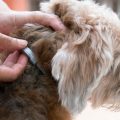If you’re thinking about bringing home a Pomsky puppy or adult dog, you may have a lot of questions, such as how big does a Pomsky get, are Pomskies high maintenance, and are Pomskies hypoallergenic? Today, we’re here to help you answer that final question. We’ll share more information about what a hypoallergenic dog breed is and whether Pomskies are considered hypoallergenic. Let’s dive into this question in the next few sections!
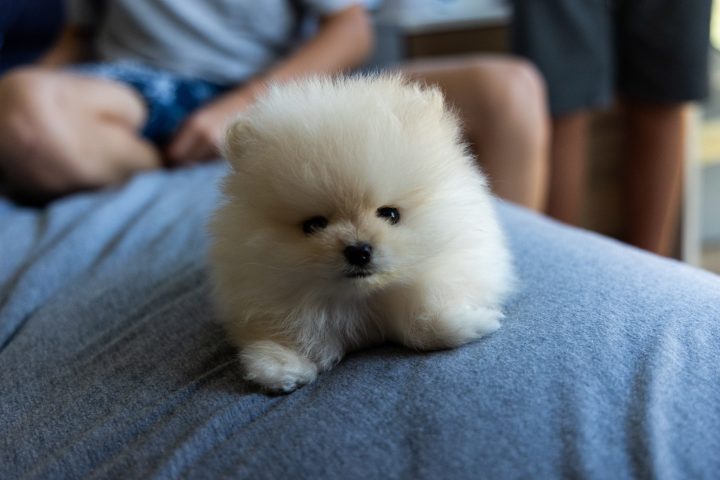
Table of Contents
- What is a Hypoallergenic Dog?
- Are Pomskies Hypoallergenic Dogs?
- Do Pomskies Shed a Lot?
- How to Limit the Amount a Pomsky Sheds
- What to Do if You Have Allergies
- Pomskies: Not a Hypoallergenic Dog
- FAQs
What is a Hypoallergenic Dog?
You’ve probably heard a lot about hypoallergenic dog breeds. So, just what is a hypoallergenic dog? Are Pomskies, Berneddodles, Bichon Frises, Yorkshire Terriers, or Aussiedoodles hypoallergenic? Are there any breeds that are truly hypoallergenic?
Hypoallergenic dogs are from breeds that don’t shed. This makes it less likely for them to cause an allergic reaction in an individual.
However, the idea of a fully hypoallergenic dog is a myth. While some dogs don’t shed as much as others, some people can be allergic to the saliva, skin dander, or urine from a dog. So, even a hypoallergenic dog could still possibly trigger allergies in some individuals.
Are Pomskies Hypoallergenic Dogs?
No, Pomskies are not a hypoallergenic dog. Like we shared above, there are no truly hypoallergenic dogs as some individuals are allergic to the saliva, urine, or dander from dogs. However, even just by the definition of a dog that doesn’t shed much, Pomskies are not hypoallergenic.
Pomskies are a hybrid dog breed. They were created by mixing Pomeranians and Huskies. Neither Pomeranians nor Huskies are hypoallergenic breeds. Both of these breeds shed, and so do Pomskies.
If you’re looking for a hypoallergenic dog that won’t shed, a Pomskies probably isn’t the best choice for you.
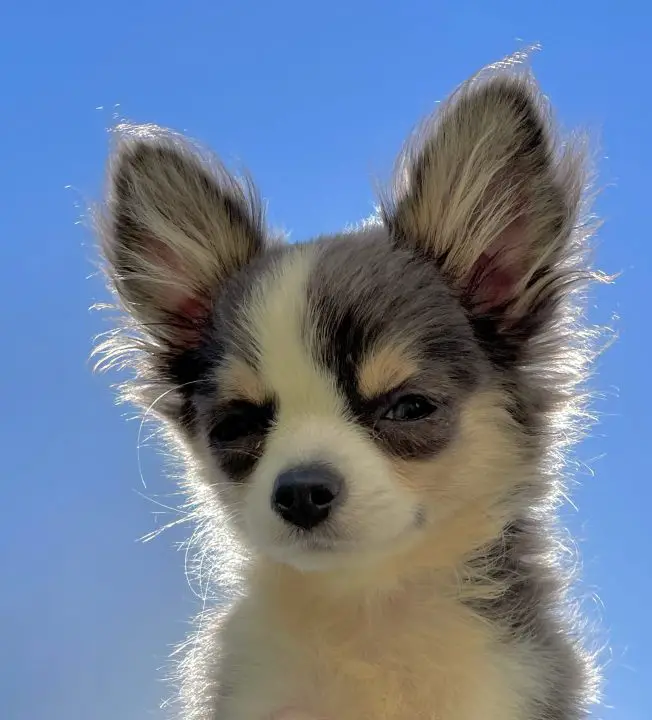
Do Pomskies Shed a Lot?
Pomskies have a very fluffy and thick coat. As we mentioned above, one of the breeds mixed to create a Pomsky is the Husky. Huskies were bred to survive in very cold climates, and, as such, have a very thick double coat. The Husky fully sheds its coat once each year, and the same is true of the Pomsky.
During the Pomsky’s shedding season in the Spring, you should expect a lot of hair to be shed all over the house. Brushing will help some, but since they’ll be shedding their entire coat during this time, it will only be able to do so much to help.
Even when it isn’t a full-on shedding season for a Pomsky, they will still shed some. This breed will shed some fur pretty much every day. So, for people who have allergies to dog hair, they likely aren’t going to be the best fit.
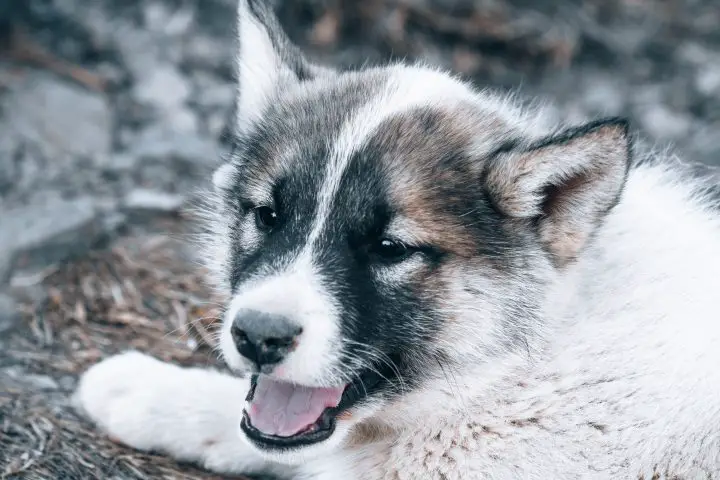
How to Limit the Amount a Pomsky Sheds
While you can’t stop a Pomsky from shedding, there are a few things you can do to limit the amount of hair all around the house.
Regular Brushing
First, it is essential to regularly brush your Pomsky. Regular brushing will help remove some of the dead hairs before they fall off. This will decrease the amount of hair that is all over your house and could help limit allergy symptoms.
Brushing is also important to prevent tangles and mats in your Pomsky’s fur. These can cause discomfort, but they can also lead to various skin conditions. And, in some cases, when the fur gets too matted, it can even cause the Pomsky to shed more.
Check for Potential Health Concerns
If you notice excessive shedding from your Pomsky, it may not be normal. Aside from their spring shedding season, this breed shouldn’t be shedding a crazy amount of fur.
Underlying health conditions can cause excessive shedding. It is possible that your Pomsky is dealing with a parasite infection that is causing stress on the body, resulting in increased shedding.
Lack of vital nutrients can also cause dogs to shed more than is normal. If you’ve recently switched food or your Pomsky hasn’t been eating normally, then this could be the cause of their shedding. If you are concerned that the excessive shedding is due to a health or nutrition concern, your first step should be to contact your veterinarian.
Stress and anxiety can also lead to increased shedding. If you’ve recently added a new pet to your family or made any other changes, they could be causing your Pomsky to feel anxious. If you believe this is the cause of the excessive shedding, you should find some extra time to spend with your pup to help decrease his feelings of stress. You can also take him to the vet if the shedding doesn’t decrease after increasing the attention he receives.
What to Do if You Have Allergies
Some wonder, “can you cut a Pomskys hair?” This isn’t a good idea because a Pomsky’s undercoat offers insulation to protect their body from both the heat and cooler temperatures.
However, if you are allergic to dogs, but are set on getting a Pomsky, there are a few things you can do to help minimize the allergy symptoms. These include:
- Limit the rooms where your Pomsky may go. Specifically, keeping him out of the bedroom can reduce allergy symptoms. Plus, with fewer rooms, it will be easier to control shedding and vacuum up hair that has been shed.
- Purchase a high-quality air filter or whole-home air purifier. This will help to remove some of the allergens from the air to reduce your symptoms.
- Brush your Pomsky regularly. This will remove much of the excess hair from their body before it falls off on the surfaces in your home.
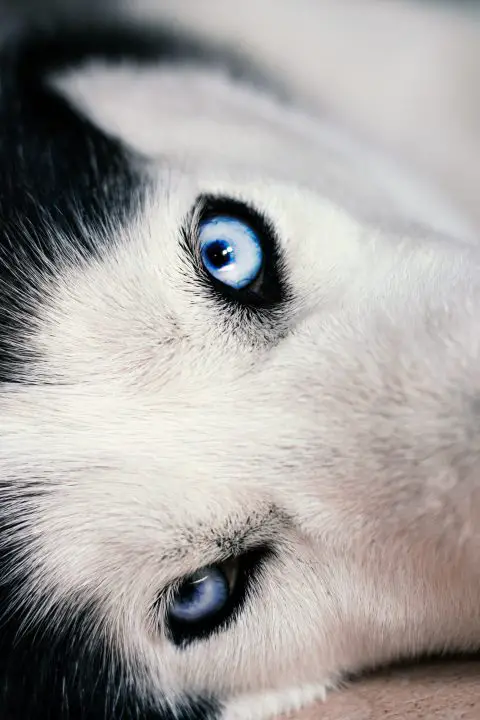
Pomskies: Not a Hypoallergenic Dog
Pomskies are an incredibly cute and fluffy dog. However, they do shed quite a bit and are not a hypoallergenic breed. If you or someone in your home suffers from allergies, this probably isn’t the best type of dog for you!
FAQs
No, Pomeranians are not considered a hypoallergenic breed. They have a long coat with a lot of hair. While they don’t shed as much as some other breeds, Pomeranians still shed a significant amount.
No, Huskies are also not a hypoallergenic dog breed. Huskies shed year round, but during their shedding seasons (during the spring and fall), they will shed a lot more to prepare for the coming changes in the weather.
